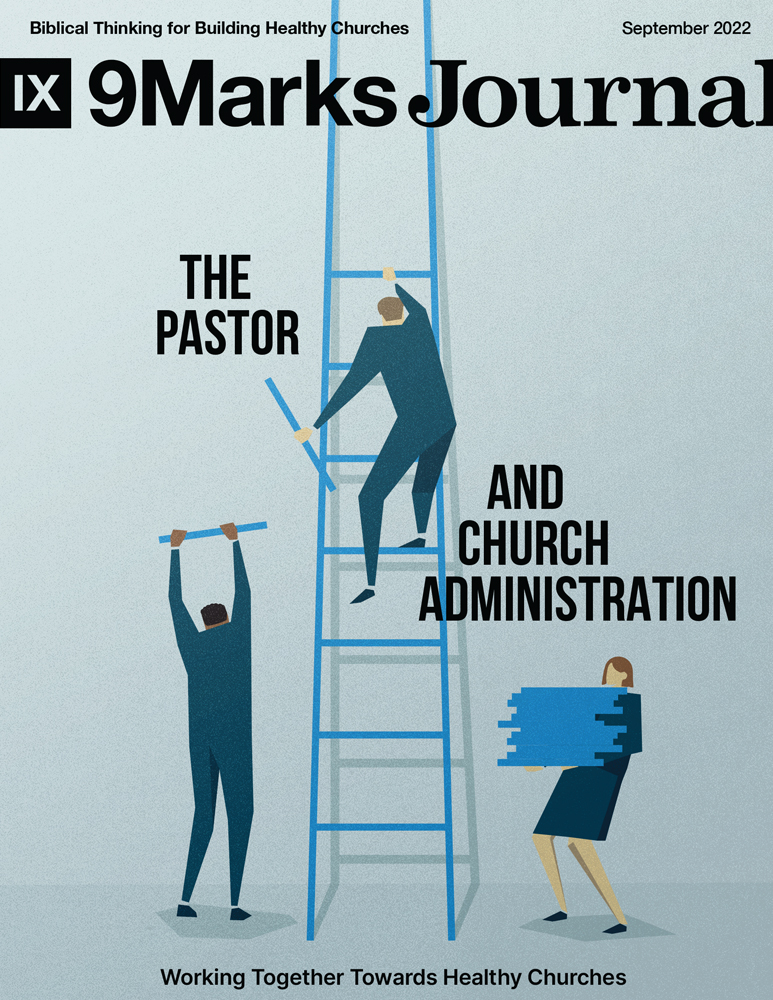
The Pastor and Church Administration
Is Administration for Pastors?
The New Testament’s First Administrators
by Brad Thayer
Administrators: Playing with Calculators or Building Up the Body of Christ?
by Mike Carnicella
Pastors, Don’t Forget to Shepherd Your Deacons
by Gus Pritchard
From the Archives: Why an Administrative Pastor
by Ryan Townsend
Staffing
Hiring and Firing
by Brad Wheeler
What Job Titles Should Churches Use? Two Simple Rules
by Jonathan Leeman
Evaluating How an Elder Is Ruling
by Bob Johnson
Why Clear Job Descriptions and Staff Structures Serve the Church
by Ryan Townsend
Why Pastors Should Submit to Each Other
by Jeff Wiesner
Buildings
Are Buildings Essential to Healthy Churches?
by Adam Sinnett
The Benefits of Having a Building
by Benjamin Woodward
What to Do When Your Building Is Full
by Mike Carnicella and Greg Gilbert
A Theological Framework for Buildings and Renovations
by John Henderson
Budgeting
How to Talk with Your Church About Money
by Jamie Dunlop
Handling Your Church’s Finances with Transparency and Integrity
by Jenny Terry
Who Should Know How Much Everyone Makes?
by Jason Read
Preparing Pastors for Retirement
by Brad Thayer
How Much Should We Pay Our Staff
by Jamie Dunlop
Addressing Staff Salary Discrepancies
by Dennis Blythe
Advocating for Your Own Pay
by Jamie Dunlop
Policies
Principles for a Benevolence Policy That Is Both Merciful and Wise
by Philip Duncanson
Why a Church Constitution Is More Than a Necessary Evil
by Greg Gilbert
How a Lack of Trellis Undermines Ministry
by Jonathan Rourke
How to Have a Well-Run Elders’ Meeting
by Aaron Menikoff
How to Use a Care List in Elders’ and Members’ Meetings
by Alex Bloomfield
LGBTQ+ Policies: What Do We Do about Youth Group?
by Zach Carter
Sabbaticals for the Shepherds
by Garrett Kell
Sample Constitution and Elder Meeting Bylaws
Editor’s Note:
Church administration is not my favorite church topic. Probably not top twenty, in fact. Yet when you need it, you need it.
Who should you hire? When should you fire? How much should you pay? What job titles should you use? What about pastoral sabbaticals and retirement contributions? What’s a constitution good for? These might not be soul-energizing questions but answering them well is a mandate of love for the church.
I learned as a young husband that, while I might want to celebrate “spontaneity” or “taking it easy,” loving my wife sometimes meant making plans, thinking ahead, establishing a few structures. This is what living with someone else, and not as a single man, means. So it is in a church. Working together well and peaceably requires attending to administration.
We asked a number of lead pastors and administration or executive pastors to help us think through matters like staffing, building, budgets and other policies. As I read every article, I found myself asking a host of further questions I would not have thought to ask before. I trust you’ll discover the same. Even if we don’t answer every question you have (far from it, I assume), you’ll have a better sense of which questions to begin asking.
Paul left Titus in Crete to “put what remained into order” (Titus 1:5). He also told the Corinthians, “all things should be done decently and in order” (1 Cor. 14:40). He was talking about the church gathering, of course, but the lesson applies more broadly. Pastors and deacons build up the body of Christ by caring for the staffing structures, pay policies, and building budgets. We pray this Journal will help.
—Jonathan Leeman
Free Download
PDF, ePub, and Kindle files will be sent to this email address. As part of our community, you will receive content & communication from 9Marks. You may unsubscribe at any time.
